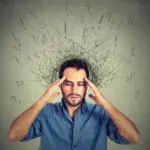Thinking is a highly complex mental action. The act of reasoning requires a large number of intermediate mental processes. In order to be able to adapt to the environment, it is necessary that we can react and use these processes with enough speed to be efficient.
However, sometimes some people suffer from some type of injury or problem that makes it more difficult for them to achieve this, having their thinking slowed down by some circumstance. These people have bradypsychia.
What is bradypsychia?
Bradypsychia is understood as symptom characterized by a generalized slowing of thought processes. Bradypsychia involves variable harm depending on the degree to which it appears.
The slowdown occurs at all levels, both in terms of the generation of thought and the implementation of different types of actions. and processes such as when understanding external information.
Some of the aspects that are slowed down are attention span, judgment and reasoning ability, reaction speed. Sometimes it can affect other aspects such as language, especially when accompanied by alogia.
Thinking is slowed down for different reasons. It is common to ramble without reaching a conclusion. repeating the thought in question until it ends. A certain rigidity and perseverance is also usually seen.
As it is a symptom that affects the way of thinking at a general level, the impact occurs in all areas of the person’s life.
Etiology of this symptom
The causes of bradypsychia can be multiple and varied.
At a neurological level, it can be observed that in many cases there is damage to the basal ganglia or to the connection of the cortex with these or with other subcortical pathways. Sometimes a lower blood volume is observed in the prefrontal area of the brain, reducing its functionality in what is called hypofrontality.
The hippocampus may also be reduced. Regarding neurotransmitters, a deficit of norepinephrine and/or dopamine can cause a decrease in alertness, which in turn can cause a slowing of thinking. Lack of acetylcholine may also be an important factor.
Another possible cause derives from the person’s focus on certain types of thinking and mental schemes, which absorb them and hinder their attention and reaction capacity.
Disorders and situations in which it appears
Bradypsychia is a symptom that can appear in a large number of situations, both in different mental disorders and in non-pathological conditions (for example, associated with drug use). Below we will see the main causes.
1. Normative aging
Once a certain age is reached, as the years go by, most people notice a more or less noticeable decrease in most of your mental abilities. As we age, bones and muscles weaken, memory worsens, and learning becomes slightly more complex than at other times in life. It is common to observe a general slowing down, both physically and mentally.
2. Dementia
Bradypsychia results very common in neurodegenerative disorders such as dementia due to neuronal degradation and death and the greater difficulty in transmitting nervous signals.
3. Schizophrenia
Slow thinking is a negative symptom of schizophrenia, which It usually appears linked to the alogy.
4. Major depression
The fact of focusing on negative thoughts, hopelessness and the feeling of lack of control that depressed subjects suffer makes it difficult for them in the long run. harder to concentrate on and react to stimulation being another context in which bradypsychia appears.
5. Substance use
Many drugs have depressant effects on the nervous system. sometimes even having narcotic effects. Psycholeptic or depressant substances in many cases cause a slowing of thinking as a direct effect of consumption (both short and long term) or as an effect of intoxication.
Treatment
Bradypsychia It is not a disorder in itself, but a symptom appearing in the event of certain injuries or disorders. The treatment to be used will depend on its cause.
In the case of major depression and schizophrenia, symptoms may improve to a greater or lesser extent based on therapy psychological and/or pharmacological that is applied. In the case of schizophrenia, the application of atypical antipsychotics can be very useful even with negative symptoms such as bradypsychia.
In other cases in which bradypsychia is directly caused by neurodegenerative disorders, such as dementia treatment tends to be palliative and be based on preserving the functionality of the subject. Some drugs can help delay symptoms, including bradypsychia.









